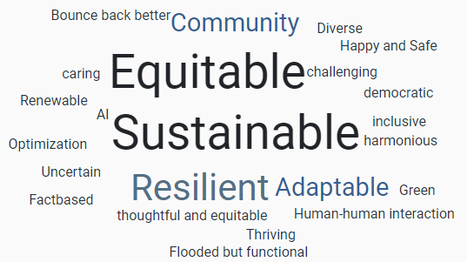|
Torry Bend and Kiera O’Donnell talk through the Stories of Change project, from where it started to how it has evolved to be larger than the original pitch. The original pitch had an underlying goal of engaging with coastal stakeholders in a meaningful way. The team wanted to create a space where people could be open and honest about climate change while still being informed about potential risks and solutions of SWISLR. They found that stories were a potential way forward with this project. Stories can be a place to hold grief, they can be a safe way to share information, and they can be used to create idealized futures and situations. To start the webinar, everyone was asked “If you were to present the version of the future in the most idealistic terms, what does that look like?” Kiera and her team of Duke students have worked through SWISLR-related papers that were associated with a social science discipline. They are working to uncover who is studying SWISLR within the social science sphere, where are SWISLR interviews and surveys taking place, how is SWISLR impacting coastal communities, and what are the means of response to SWISLR impacts. The past semester was all about extracting information from SWISLR social science research, and now the team at Duke is working on analyzing the data and synthesizing the information they worked to pull out of the literature. They specifically will be looking at what questions are being asked in these papers and surveying the surveyors to ask them what questions should be asked. To find out more about this project you can see their first semester findings described in this blog post: https://apnep.nc.gov/blog/2024/01/22/saltwater-intrusion-sea-level-rise.
Through engaging with community members, Torry has been able to create and collaborate on 4 different projects and has taken the original goal of co-creating stories of change to the next level. Torry found the original questions and goals laid out during the all-hands meeting were becoming stretched and changed based on who she was talking to and the timing of when people were able to talk. The first project is working with K-12 students to write and create resiliency fables to give the students power in their future and an outlet for their grief and worry surrounding climate change. The second project is creating a collective of people working in puppetry and climate change so as opportunities come up there is a network of people working in this sphere that can be connected to the project in question. The third project is making a documentary on farming in Princeville, a coastal North Carolina town. The farmer Torry is working with talked about their connection to the land, the changes they have made throughout their life, and the changes they will have to make in future SWISLR-induced farm fields. The last project is a short live puppet show on moving away from the coast with the intent to connect an art form to information. Although migration is a tough topic to talk about, the connection to art and puppetry is a creative way of softening some of the anxiety surrounding it. All these projects came out of the idea that stories can be a powerful tool to talk about anxieties surrounding climate change. We finished the webinar with a discussion on public spaces and factors that have facilitated safe spaces to share ideas and thoughts about climate change. You can watch the presentations and the discussion here. https://youtu.be/E924S_bvdBA
0 Comments
Leave a Reply. |
AuthorsKiera O'Donnell:[email protected] Archives
March 2024
Categories |

 RSS Feed
RSS Feed
